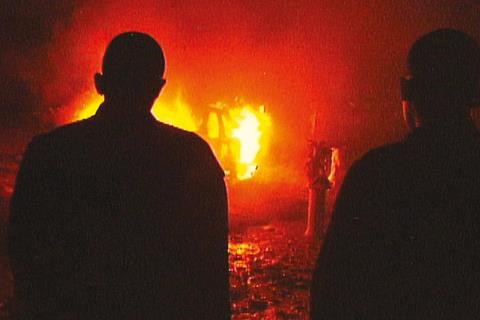Harmony Korine produces the unfocused feature about disaffected kids, which premieres in Venice Horizons

Dir/scr: Stillz. USA. 2025. 88mins
In the Harmony Korine-produced Barrio Triste, a motley crew of kids facing near-hopeless circumstances in 1980s Medellín, Colombia, yearn for a better life that would take something of a miracle. There are many ways in which this story could unfold, but Colombian-American debut filmmaker Stillz chooses to tell it by having the protagonists steal a video camera from a TV crew and then letting them film their own reality.
The different elements never coalesce into someting more meaningful
What sounds like a potentially interesting — if not particularly original — conceit yields results that are more often boring or baffling than actually insightful or at least intriguing. While Stillz is well known for his music videos and photography work with the likes of Bad Bunny, this Venice Horizons title may struggle to make an impact beyond the festival circuit.
A TV presenter preparing a news item about strange, possibly extraterrestrial occurrences in Medellín doesn’t get to talk much before a handful of teenage boys make off with his camera. This being the 1980s, the thing is huge and cumbersome, and it isn’t clear why the protagonists want to film or even what they want to shoot. There’s a very high randomness factor from the get-go, including the question of why this story needs to be set in the 1980s; there’s hardly any nods to socio-political or historical context, nor many period-specific references.
The footage — Stillz himself is credited as the cinematographer — feels like it’s about one-third shots of asphalt, dirt roads and the kids’ shoes as they walk, which means the thieves are simply pointing the camera down. Why would they film something literally so pedestrian? Another third of the feature shows us dark alleyways in badly lit neighbourhoods, and the walls of the abandoned buildings and never-finished constructions in which the teens hang out. The result is that, for more than half of the running time, we mostly see empty streets and buildings. The fact that the material is all low-fi video (or treated in post to look like low-fi video), doesn’t help in this regard, even if it supposedly makes the material look more authentic.
The film’s other elements struggle to compensate for the lack of visual sophistication. This inclues the overbearing score from Venezuelan-born, Barcelona-based electronic artist Arca, with whom Stillz has collaborated before. It completely undermines any idea that we may be watching something culled from reality, something raw and unfiltered.
There are a handful of irregular, direct-to-camera interview snippets with some of the youngsters, which could have provided an emotional shortcut to their feelings of despair and loneliness, but there are several issues here, too. Firstly, it’s not clear who is interviewing them, or who they are talking to. (At times, you wonder whether it’s a post-production intervention to try and give the material an emotional core.)
Additionally, the entire interview setup (and even some of its contents) feels lifted directly from Theo Montoya’s superior, tightly-controlled Anhell69 (2022), which was also set in Medellín and had a similar supernatural-ish twist, which had not only cinematic smarts to spare but felt like it gently took you by the hand to get you somewhere specific. In Barrio Triste, the different elements never coalesce into someting more meaningful. Perhaps this is an apt metaphor for the lives of these kids, but it’s not likely to appeal to the majority of audiences.
Production companies: EDGLRD, We Own the City
International sales: Magnify - akennedy@magpictures.com
Producers: Harmony Korine, James Clauer, Esteban Zuluaga, Eric Kohn
Cinematography: Stillz
Production design: Daniel Rincón Zapata “Oso”
Editing: Adam Robinson
Music: Arca
Main cast: Juan Pablo Baena, Samuel Velázquez, Tomás Tinoco Higuita, Samuel Andrés Celis, Brahian Acevedo, Estiven Salazar, Brayan Erlín García, José Arley Marín González, Samuel Ruiz















![[L-R]: Amanda Villavieja, Laia Casanovas, Yasmina Praderas](https://d1nslcd7m2225b.cloudfront.net/Pictures/274x183/6/4/1/1471641_pxl_20251224_103354743_618426_crop.jpg)








